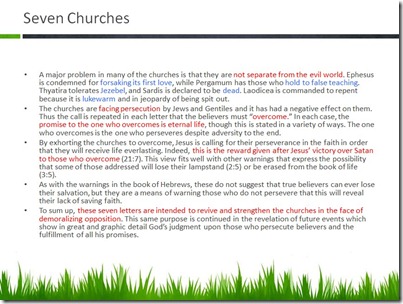Everything about the following sentence is wrong. For analysis, I ‘ll break it down into phrases, but it’s all one sentence. From Bruce Waltke, An Old Testament Theology, page 824:
The prophets ‘ predictions embrace
a beginning of fulfillment in Israel’s restoration from the exile,
a victorious fulfillment in the church age stretching from Christ’s first advent to his Parousia,
and a consummation in the eschatological new heaven and earth when Christ’s kingdom becomes coextensive with his creation.
I ‘ll take my first statement back: I have no objection to the first four words of the sentence. But after that, it’s a complete disaster.
First, were the prophets ‘ predictions fulfilled in Israel’s return to exile? In response, I would recommend you read any of the post-exilic books. The clear message of the books of Ezra, Nehemiah, Haggai, Zechariah, and Malachi is that the prophecies weren’t being fulfilled. The problem was not God’s faithfulness but the people’s response. Nevertheless, the prophets encouraged them that though they did not see the prophecies of restoration being fulfilled, God would still keep his promises. Therefore, obey!
Second, Waltke suggests that the prophet’s predictions have enjoyed a “victorious fulfillment in the church age.” Now, setting aside for the moment every single thing that those prophets said, I just have to ask, where is this victory? I don’t want to put the church down, and I know that the Lord is working faithfully in it every day, but I emphatically do not see, now or ever in the church’s history, anything that God would call a victory. The church was in awful shape from the time of Corinth to the letters of Revelation through the Middle Ages until today. You could argue that while the “professing church” is a miserable failure (think everything from “Crusades” to Joel Osteen’s megachurch), the true church is the “victorious fulfillment.” And while those who have been saved and made a part of the body of Christ have infinite reason to rejoice, it’s a distant cry from what the prophets foretold. Besides all of this, it might be observed that Paul explicitly said that the prophets didn’t foretell the church, as its existence was a mystery made known first to the apostles (Eph 3).
Finally, you think I could at least agree with Waltke that the promises of the prophets will be fulfilled in the “consummation in the eschatological new heaven and earth.” Alas, the irony is that while Waltke suggests three periods of fulfillment for the glorious words of guys like Isaiah and Ezekiel and Zechariah, he fails to mention the one period when these prophecies actually will be fulfilled! Of course, I am speaking of the time when Jesus “will be king over the whole earth” and when the city of Jerusalem will be re-named “the Lord is there” and the nations will stream up to the holy city where the Messiah will “comfort all who mourn” (Zech 14:9; Ezek 48:35; Isa 2:2; 61:2).
How can Waltke and I disagree so severely? Very simply: he believes that the OT prophecies must be “spiritualized, transcendentalized, eschatologized, and typified.” But I observe that all the prophecies in the past were fulfilled “normally, literally, and according to the way that all sensible people read words,” and Waltke would agree with that. (Jesus was born in Bethlehem, ministered in Galilee, was crucified and resurrected, etc.) It’s only the prophecies that have not yet been fulfilled that must be “spiritualized.” That leaves you playing hopskotch in the prophets, with one verse being fulfilled literally and the next one being fulfilled spiritually, and the one after that being literal, etc. He thinks that spiritualizing them makes them better. I say that it not only does it make them worse, but it steals them from the people to whom they were promised.

